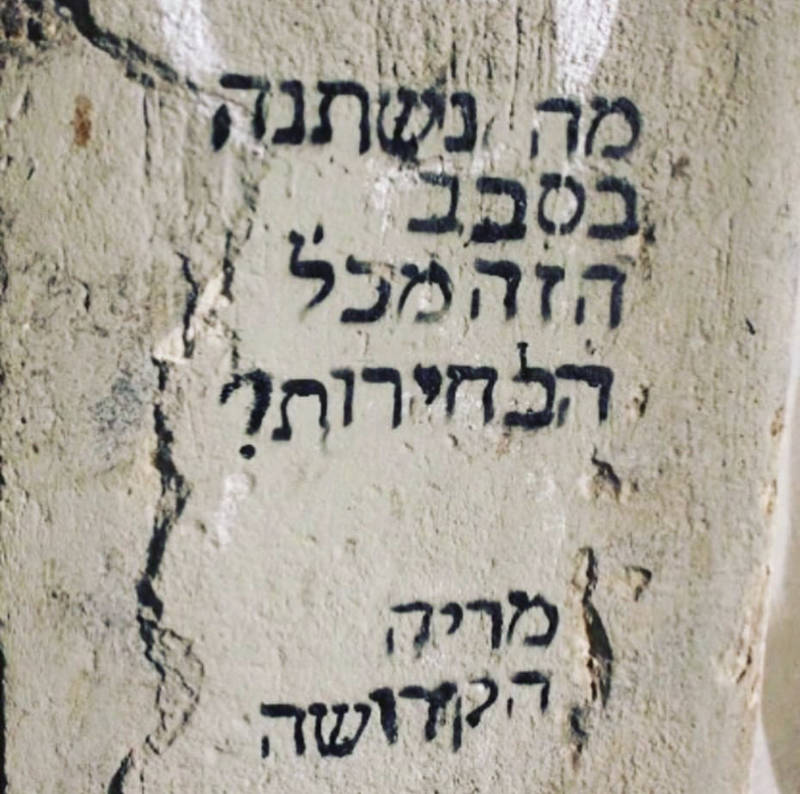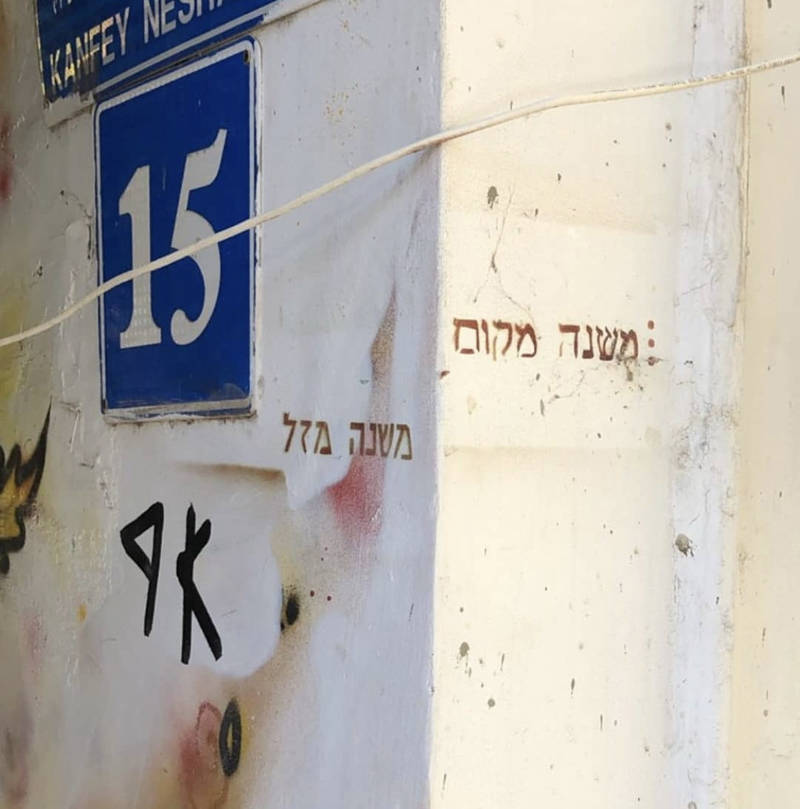Shabbat Pesach 5781 - Mah Nishtanah?
Parashat Beshalach: In Honor of Dr. Martin Luther King, Jr. - Get Going!
April 2, 2021
Shabbat Pesach 5781 - Mah Nishtanah?
Last weekend, at our Temple seder and at seders around the world, we asked ourselves a well-worn question: Mah nishtanah halaila hazeh mi’kol halailot? - Why is this night different from all other nights?
Of course, that question carried more humor and novelty at our first virtual Passover seders in 2020 - a year ago, we asked ourselves, Why is this night different from all other nights? And the answer was obvious - everything about a virtual seder, held on zoom, removed from family and friends, with purell on our seder plates and family and friends far away, was different.
So 2021 was the second time we tried to understand - why is this night - seder night in 2021, the second year of our global pandemic, different from all other nights?
In some ways, nothing was different - sitting at our screens, sharing Passover remotely, we were unchanged.
And yet, having made our way through a full Jewish calendar year since we last asked ourselves - Mah Nishtanah?, many things have, in fact, changed for the better. What’s more, we’ve had the opportunity to move from the passive - what has changed for us, what is different - to the active - what do we have in our power to make different, to change?
As some of you know, I have a very limited social media diet, but I do like to follow an instagram account of street art and graffiti in Tel Aviv. I miss wandering the streets there myself, so this account is the next best thing. Recently, I came across two powerful street sayings.
Playing on the spirit of Passover, one anonymous philosopher wrote on a wall:
Mah nishtanah b’sivuv hazeh mi’kol b’chirot?
You hear that familiar phrase - mah nishtanah - what is different, what has changed - and the writer continues:
What is different in this round of elections from all other elections?

Riffing on the four questions, this sardonic observer wonders what made Israel’s fourth round of elections in only two years different from the previous ones. Each time, there has been no clear majority, no mandate for the country to move forward. The writer expresses doubt and frustration at the intractable political situation. I love this, because in Israel, the words of our Haggadah, which are in turn a quotation from the Mishnah, are alive and well on the streets of Tel Aviv, and used to make sarcastic commentary about the political reality.
While not voters in Israel, we may feel both the intractability of their politics, and the twist on the question - mah nishtanah b’sivuv hazeh - what’s different this time around? - also speaks to our current reality, celebrating a second pandemic Passover.
It is so easy to get stuck in mah nishtanah b’sivuv hazeh - what’s different this time around? While many are accessing vaccines, a long and frustrating wait remains for many others. While our most vulnerable are protected, cases and hospitalization is on the rise in our community and others once again. While Tanglewood will open for a limited season, it will not be a full-fledged summer on the lawn that we dream of. While we prepare for future events and services where we may gather as a Temple family in person, here we are, still on zoom. Mah nishtanah?
That verb - nishtanah - as I mentioned, is a passive one. The change happens to us - or it doesn’t. Much of the pandemic has been an experience of passivity - social isolation, lockdowns, health challenges, separation and loneliness - all happening to us.
So I smiled when I saw another graffiti artist, perhaps in conversation with our first writer.

Wittily, on a street corner, this commentator penned: Mishaneh makom, mishaneh mazal. Change your place, change your luck.
I had to laugh, because to read this in person, you need to physically change your place, your location, on the street corner to read the first part of the phrase and the second. And once again, our Israeli street artist of 2021 speaks with words of our ancient text, this time, quoting a common Israeli aphorism originally found in the Talmud.
Change your place, change your luck. We hear that same verb from the four questions, and yet, it is active. You make the change, you change your luck.
Physically, it might have been very hard for some of us to change our places this past year. I love being in the Berkshires, and this was still the longest stretch of time that I have spent in our county - let alone most of it in my house. Changing my place mostly consisted of moving from working at my kitchen counter to working at my desk, and back again.
But of course, even if we cannot physically change our places by traveling or visiting local destinations or homes of friends, this active type of change can be both literal and figurative. If you cannot change your physical place, how can you change your place, mentally, and still change your mazal, your luck, your fortune?
We all have the power to change our mental state, as hard as it might be in these challenging times. We all have the ability to look for the good, to see the glass half full, to appreciate what we have. Mishneh makom, mishaneh mazal. Change your place, change your outlook, change your perspective - change your fortune and your luck.
As we move out of the narrow places of our pandemic and Passover, I offer us these two ways to look at change - it can happen to us, or we can make it happen. As we actively pursue a better life and better future in the months to come, I hope we will all soon have the chance to change our places, our fortunes, our luck, and our lives. Shabbat shalom and chag sameach
Rabbi Liz P.G. Hirsch
Temple Anshe Amunim | Pittsfield, MA
Fri, October 31 2025
9 Cheshvan 5786
Zmanim
| Alot Hashachar | 6:00am |
| Earliest Tallit | 6:33am |
| Netz (Sunrise) | 7:25am |
| Latest Shema | 10:00am |
| Zman Tefillah | 10:53am |
| Chatzot (Midday) | 12:36pm |
| Mincha Gedola | 1:02pm |
| Mincha Ketana | 3:38pm |
| Plag HaMincha | 4:43pm |
| Candle Lighting | 5:30pm |
| Shkiah (Sunset) | 5:48pm |
| Tzeit Hakochavim | 6:31pm |
| More >> | |
Join Our Mailing List
Temple Anshe Amunim
26 Broad Street
Pittsfield, MA 01201
phone: (413) 442-5910
fax: (413) 442-8315
e-mail:
templeoffice@ansheamunim.org
A proud affiliate of  and
and 

Social Action working with Religious Action Center of Reform Judaism
Directions
THIS WEEK AT TAA
Friday Night
: 5:30pm |
Shabbat Day
| Torah Study : 9:30am |
Upcoming Programs & Events
Nov 14 Shabbat Dinner - celebrating Sigd Friday, Nov 14 6:15pm |
Dec 19 Latkefest dinner Friday, Dec 19 6:15pm |
QUICK LINKS
Privacy Settings | Privacy Policy | Member Terms
©2025 All rights reserved. Find out more about ShulCloud
